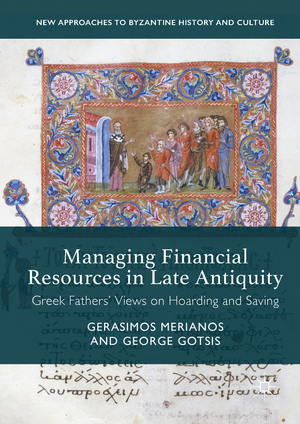Managing Financial Resources in Late Antiquity: Greek Fathers' Views on Hoarding and Saving: New Approaches to Byzantine History and Culture
Autor Gerasimos Merianos, George Gotsisen Limba Engleză Hardback – 3 apr 2018
| Toate formatele și edițiile | Preț | Express |
|---|---|---|
| Paperback (1) | 693.57 lei 6-8 săpt. | |
| Palgrave Macmillan UK – 13 noi 2020 | 693.57 lei 6-8 săpt. | |
| Hardback (1) | 698.94 lei 6-8 săpt. | |
| Palgrave Macmillan UK – 3 apr 2018 | 698.94 lei 6-8 săpt. |
Din seria New Approaches to Byzantine History and Culture
- 15%
 Preț: 635.96 lei
Preț: 635.96 lei - 15%
 Preț: 693.57 lei
Preț: 693.57 lei - 18%
 Preț: 791.57 lei
Preț: 791.57 lei - 15%
 Preț: 530.42 lei
Preț: 530.42 lei - 15%
 Preț: 705.34 lei
Preț: 705.34 lei - 15%
 Preț: 532.56 lei
Preț: 532.56 lei - 15%
 Preț: 697.82 lei
Preț: 697.82 lei - 18%
 Preț: 891.96 lei
Preț: 891.96 lei - 9%
 Preț: 762.75 lei
Preț: 762.75 lei - 18%
 Preț: 722.89 lei
Preț: 722.89 lei - 18%
 Preț: 721.63 lei
Preț: 721.63 lei - 18%
 Preț: 724.63 lei
Preț: 724.63 lei - 18%
 Preț: 725.75 lei
Preț: 725.75 lei - 15%
 Preț: 634.49 lei
Preț: 634.49 lei - 18%
 Preț: 781.00 lei
Preț: 781.00 lei - 15%
 Preț: 691.91 lei
Preț: 691.91 lei - 18%
 Preț: 727.48 lei
Preț: 727.48 lei - 18%
 Preț: 732.70 lei
Preț: 732.70 lei - 15%
 Preț: 637.13 lei
Preț: 637.13 lei - 18%
 Preț: 735.84 lei
Preț: 735.84 lei - 18%
 Preț: 738.69 lei
Preț: 738.69 lei
Preț: 698.94 lei
Preț vechi: 822.29 lei
-15% Nou
Puncte Express: 1048
Preț estimativ în valută:
133.75€ • 138.19$ • 111.26£
133.75€ • 138.19$ • 111.26£
Carte tipărită la comandă
Livrare economică 19 martie-02 aprilie
Preluare comenzi: 021 569.72.76
Specificații
ISBN-13: 9781137564085
ISBN-10: 1137564083
Pagini: 256
Ilustrații: XI, 257 p.
Dimensiuni: 148 x 210 mm
Greutate: 0.48 kg
Ediția:1st ed. 2017
Editura: Palgrave Macmillan UK
Colecția Palgrave Macmillan
Seria New Approaches to Byzantine History and Culture
Locul publicării:London, United Kingdom
ISBN-10: 1137564083
Pagini: 256
Ilustrații: XI, 257 p.
Dimensiuni: 148 x 210 mm
Greutate: 0.48 kg
Ediția:1st ed. 2017
Editura: Palgrave Macmillan UK
Colecția Palgrave Macmillan
Seria New Approaches to Byzantine History and Culture
Locul publicării:London, United Kingdom
Cuprins
Chapter 1. Introduction.- Chapter 2. Historical Background: Early Christian Conceptions of Hoarding.- Chapter 3. Justifying Savings but not the Pursuit of Wealth: Contradictions, Tensions and Accommodations in Early Patristic Texts.- Chapter 4. Savings for Redistributive Purposes: Stewardship of Wealth in the Teachings of Basil of Caesarea and John Chrysostom.- Chapter 5. Fifth-Century Patristic Conceptions of Savings and Capital: Isidore of Pelusium and Theodoret of Cyrrhus.- Chapter 6. Contextualizing Patristic Concepts of Hoarding and Saving.- Chapter 7. Conclusions.- Bibliography.- Index.
Notă biografică
Gerasimos Merianos is Senior Researcher in Byzantine History at the Institute of Historical Research of the National Hellenic Research Foundation, Athens, Greece.
George Gotsis is Associate Professor of Economics in the Department of History and Philosophy of Science at the National and Kapodistrian University of Athens, Greece.
George Gotsis is Associate Professor of Economics in the Department of History and Philosophy of Science at the National and Kapodistrian University of Athens, Greece.
Textul de pe ultima copertă
This book examines the views of Greek Church Fathers on hoarding, saving, and management of economic surplus, and their development primarily in urban centres of the Eastern Mediterranean, from the late first to the fifth century. The study shows how the approaches of Greek Fathers, such as Clement of Alexandria, Basil of Caesarea, John Chrysostom, Isidore of Pelusium, and Theodoret of Cyrrhus, to hoarding and saving intertwined with stances toward the moral and social obligations of the wealthy. It also demonstrates how these Fathers responded to conditions and practices in urban economic environments characterized by sharp inequalities. Their attitudes reflect the gradual widening of Christian congregations, but also the consequences of the socio-economic evolution of the late antique Eastern Roman Empire. Among the issues discussed in the book are the justification of wealth, alternatives to hoarding, and the reception of patristic views by contemporaries.
Caracteristici
Provides a comprehensive overview of Greek patristic responses to the management of surplus income and savings from the late first to the fifth century Seeks to identify differing types of hoarding practices and examines multilevel outcomes of hoarding behaviours Utilises a range of sources, informed by the history of ideas, economic history, and history of economic thought
